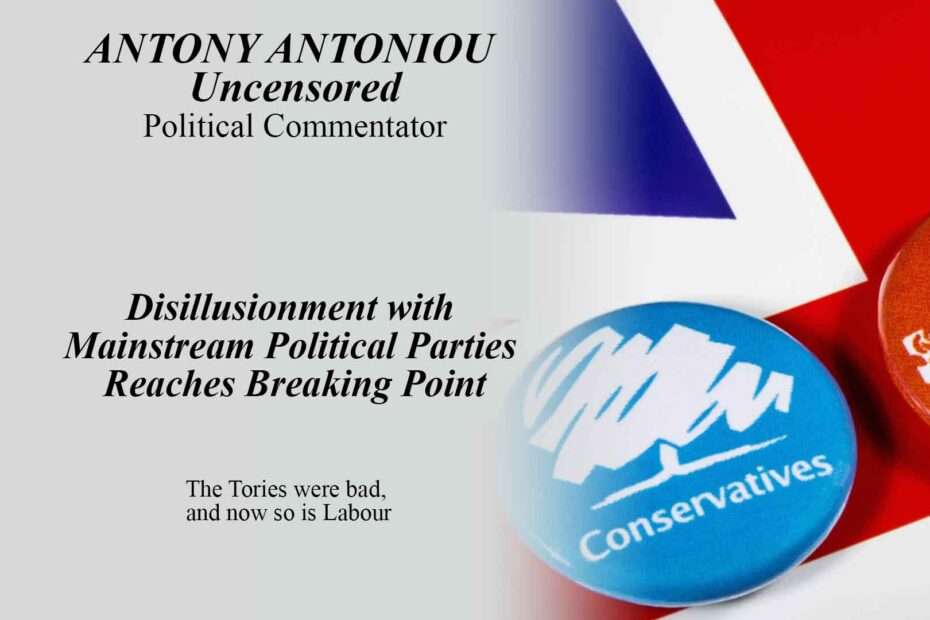Disillusionment with Mainstream Political Parties Reaches Breaking Point
The current political landscape in the United Kingdom has reached a critical juncture, where voters have become increasingly disillusioned with the traditional political establishment. The Conservative Party’s protracted period of governance, marked by a series of spectacular failures, has given way to a Labour Party that appears equally incapable of addressing the nation’s fundamental challenges.
The Conservative Twilight: A Catalogue of Failures
The previous Conservative Government’s tenure was characterised by a remarkable sequence of policy catastrophes and administrative ineptitude. From the infamous mini-budget of 2022 that sent financial markets into a tailspin to the scandalous “partygate” episode that exposed the government’s brazen disregard for pandemic restrictions, the Conservatives managed to erode public trust with remarkable consistency.
Their policy promises emerged as nothing more than hollow rhetoric. The NHS, ostensibly a priority, became increasingly inaccessible, with patients facing interminable waiting times and diminishing healthcare resources. Economic promises of growth dissolved into a quagmire of stagnation and rampant inflation. Immigration—a perennial political football—continued to rise to levels that even previous Labour administrations would have found challenging to defend.
The rhetoric of “levelling up” proved to be particularly mendacious. While politicians pontificated about regional regeneration, local high streets became ghostly landscapes of boarded-up shops and economic despair. Promises to tackle anti-social behaviour rang hollow as public spaces in numerous towns and cities descended into conditions of neglect and disorder.
Labour’s Premature Triumphalism
Keir Starmer’s Labour Party, in its eagerness to differentiate itself from the Conservative shambles, committed a strategic error of significant magnitude. By consistently portraying the previous government as uniquely incompetent, they inadvertently set themselves an almost impossible standard of performance.
The simplistic narrative of “change” as a panacea for the nation’s multifaceted challenges was always going to be problematic. Voters, initially receptive to this message, quickly discovered that systemic issues are not resolved through mere political transition.
The Fundamental Malaise of Contemporary Politics
At the heart of this political dysfunction lies a profound psychological disconnect. Politicians across the spectrum suffer from an endemic condition of intellectual hubris. Each political faction views itself as inherently superior, populated by visionaries, while perceiving their opponents as fundamentally incompetent.
This hyper-confident approach has cultivated a perpetual cycle of political disillusionment. By consistently overpromising and dramatically under-delivering, political parties have systematically eroded public trust. The consequence is a growing sentiment of cynicism that threatens the very foundations of representative democracy.
A Potential Beacon of Hope?
Amidst this political quagmire, some emerging political figures offer a potentially different approach. Kemi Badenoch represents an intriguing deviation from the established political narrative. Her reluctance to make grandiose promises and her philosophical scepticism towards expansive state intervention might signal a more nuanced approach to governance.
The Growing Appetite for Alternative Political Movements
Focus groups preceding the last general election revealed a profound sentiment of political exhaustion. Many voters viewed their engagement with Labour as a final opportunity for meaningful political transformation. The implicit warning was clear: failure to deliver substantive change would result in a wholesale abandonment of mainstream political structures.
The conditions are now ripe for the emergence of alternative political movements. Parties like Reform are well-positioned to capitalise on this widespread disenchantment. The traditional political establishment’s survival depends on a fundamental recalibration of expectations and a genuine commitment to realistic, achievable objectives.
Conclusion: A Critical Moment of Political Reckoning
The United Kingdom stands at a critical political crossroads. The traditional mechanisms of political representation are under unprecedented strain. Unless mainstream political parties demonstrate a capacity for genuine self-reflection, humility, and a recognition of the limits of state intervention, they risk becoming increasingly marginalised.
The message from the electorate is unambiguous: political parties must cease their cycle of perpetual over-promising and under-delivering. Failure to heed this warning may well precipitate a radical restructuring of the political landscape, with potentially far-reaching consequences for the future of British democracy.

